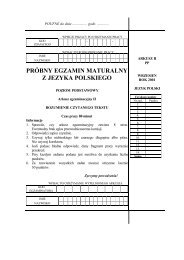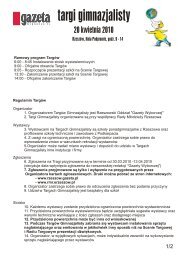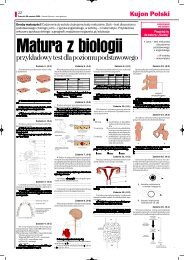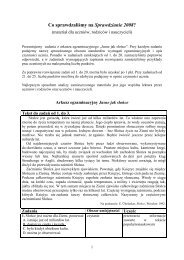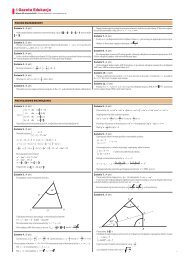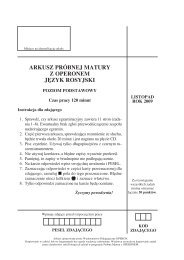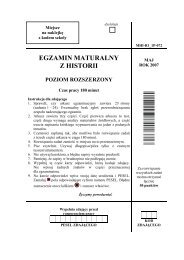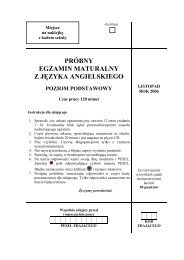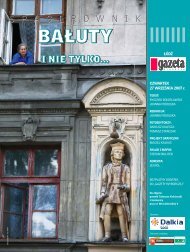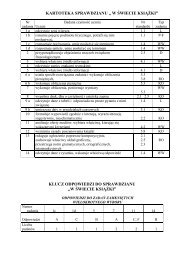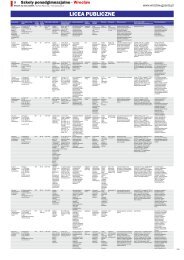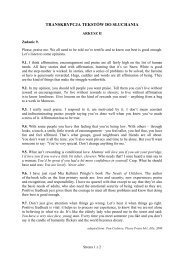Polish your English - Gazeta.pl
Polish your English - Gazeta.pl
Polish your English - Gazeta.pl
Create successful ePaper yourself
Turn your PDF publications into a flip-book with our unique Google optimized e-Paper software.
JĘZYK ANGIELSKI. Matura pisemna<br />
<strong>Polish</strong> <strong>your</strong> <strong>English</strong><br />
Pisemny egzamin dojrzałości<br />
z języka angielskiego w szkołach dla<br />
młodzieży w województwie dolnośląskim 7<br />
maja 2003, godzina 9<br />
ZADANIA<br />
TEKSTY DO ROZUMIENIA ZE SŁUCHU<br />
(Na maturze otrzymał je tylko nauczyciel)<br />
TEKST I<br />
SPEAKER ONE<br />
I think that the procedure for getting <strong>your</strong> driving<br />
licence should change. I took the written test in<br />
school when I was 15 but had to wait until I turned<br />
16 to get my permit. Well, by that time my test<br />
results had already expired! That was frustrating –<br />
but it got worse! I took the test for the second time<br />
and failed. I was com<strong>pl</strong>etely aggravated. I finally<br />
passed the written test a cou<strong>pl</strong>e of months ago; however,<br />
in my state even if you are the legal age to<br />
drive, you still have to wait six months once you get<br />
<strong>your</strong> permit before you get <strong>your</strong> licence. That means<br />
I will be 18 when I can officially drive, and by that<br />
time, I’ll be leaving for college and won’t be able to<br />
have a car. I was so excited to drive when I first<br />
turned 17, but after going through all this drama to<br />
get my licence, I’m totally disappointed.<br />
SPEAKER TWO<br />
One day, my dad – who was teaching me to drive<br />
a stick shift – decided I was finally good enough to<br />
drive outside the local hospital parking lot. I pulled<br />
onto a maintenance road, got up to 30 mph and was<br />
feeling confident. Then I stopped too short at a stop<br />
sign. My dad got impatient and told me to keep<br />
going. Suddenly, sirens started blaring and someone<br />
on a bullhorn told me to pull over, which I wasn’t<br />
sure how to do. I finally just stopped the car in the<br />
middle of the road. Turns out that hospital security<br />
thought I was driving drunk! Luckily, my dad is<br />
a doctor there, and once we showed the officers my<br />
learner’s permit, they let me go.<br />
SPEAKER THREE<br />
I’ve had bad luck with cars in general. I failed both<br />
the written and driving tests. After I finally passed, my<br />
dad bought me a car, and two days later someone hit<br />
me in the school parking lot. Then, the same day my<br />
mom bought me a new car, someone hit it in another<br />
parking lot and broke my taillight! A month later, I got<br />
a parking ticket near my school. Instead of paying,<br />
I chose not to drive to school for 15 days. The first day<br />
I drove to school again, someone rammed into my rear<br />
bumper. My total bill for tickets and damages was<br />
$5.000. I’m obviously not meant to drive.<br />
(Według magazynu Seventeen March 2003)<br />
TEKST II<br />
40,000 peo<strong>pl</strong>e marched through central London on<br />
21 st September in support of foxhunting. The protesters<br />
are angry that Tony Blair’s government is set<br />
to ban the ancient “blood sport”. Hunting horns<br />
blared and whistles blew as the demonstrators<br />
walked passed the Houses of Parliament shouting,<br />
“Blair, ban hunting and we’ll boot you out.”<br />
Foxhunting is practised by only a small minority of<br />
the British population. The participants are mainly<br />
from rural areas and those from the upper classes.<br />
Prince Charles is a supporter. On hearing of the<br />
Labour Government’s <strong>pl</strong>ans to ban the blood sport,<br />
the Prince was heard to say, “I might as well leave<br />
the country.”<br />
The majority of the British public have never supported<br />
what many feel is a cruel and barbaric way to<br />
spend one’s leisure time. The latest opinion polls<br />
show that around 65% of the population wishes to<br />
see foxhunting banned. Only 24% support it. 64% of<br />
those polled also said that the Royal Family set a bad<br />
exam<strong>pl</strong>e to others by taking part in blood sports.<br />
Those who support foxhunting say that it is<br />
a humane way to control the number of foxes in the<br />
countryside. They say that 6,000 jobs depend on the<br />
sport. They also think that it is a lot of fun. Those<br />
against the sport say that other methods of controlling<br />
foxes are less cruel. Foxhunting involves men<br />
and women in red coats shouting “Tally Ho”, who,<br />
along with around 50 dogs, chase a fox around the<br />
countryside. If the fox is caught then it is ripped to<br />
pieces by the dogs. Sounds like a nice way to spend<br />
a Sunday afternoon. Doesn’t it?<br />
(Według magazynu The World of <strong>English</strong> No 5 2002)<br />
CZĘŚĆ I<br />
ROZUMIENIE TEKSTU SŁUCHANEGO<br />
ZADANIE A<br />
Po dwukrotnym wysłuchaniu wypowiedzi trzech dziewcząt zdecyduj,<br />
której z nich dotyczą poniższe zdania (1-9).<br />
Zaznacz znakiem 4 odpowiednią rubrykę w tabeli. Za poprawne<br />
wykonanie tego zadania możesz uzyskać 9 punktów.<br />
Speaker Speaker Speaker<br />
One Two Three<br />
0 She had a learner’s permit. (przykład)<br />
1. She thinks she shouldn’t drive at all.<br />
2. She didn’t pass the driving test the first time.<br />
3. She had to take the test<br />
the second time because of the regulations.<br />
4. She was stopped for breaking the traffic<br />
regulations.<br />
5. She had a series of small accidents.<br />
6. She thinks it takes too long to get<br />
a driving licence.<br />
7. She is com<strong>pl</strong>aining about the driving licence<br />
regulations in her state.<br />
8. She was taught to drive by her dad.<br />
9. She had to pay a lot of money for repairs<br />
and tickets.<br />
ZADANIE B<br />
Po dwukrotnym wysłuchaniu wiadomości zdecyduj, które z poniższych<br />
zdań są zgodne (TRUE) z zawartymi w nich informacjami,<br />
a które nie (FALSE). Zaznacz znakiem 4 odpowiednią rubrykę w tabelce.<br />
Za prawidłowe rozwiązanie tego zadania<br />
możesz uzyskać 6 punktów.<br />
TRUE FALSE<br />
1. The march in London was organised<br />
to protest against foxhunting.<br />
2. Prince Charles shares the protesters’ opinion.<br />
3. Foxhunting is popular<br />
with the majority of Britons.<br />
4. The Royal Family is criticised<br />
for supporting foxhunting by a considerable part<br />
of the British population.<br />
5. The text provides a description<br />
of what foxhunting involves.<br />
6. The text presents only arguments against foxhunting.<br />
CZĘŚĆ II<br />
ROZUMIENIE TEKSTU CZYTANEGO<br />
Zadanie A<br />
Przeczytaj uważnie poniższy tekst. W części<br />
I wybierz jedną zgodną z tekstem odpowiedź i zakreśl<br />
A, B albo C. W części II, spośród 15 pytań oznaczonych<br />
literami od A do O wybierz 9 takich, na które<br />
znajdziesz odpowiedź w tekście. Wpisz do tabelki<br />
litery oznaczające wybrane pytania. Kolejność<br />
wpisywanych liter nie jest ważna. Za poprawne<br />
rozwiązanie tego zadania możesz uzyskać 10 punktów.<br />
Has anyone got a home for me?<br />
It’s springtime, when thoughts turn to nesting. My<br />
boyfriend and I are moving. This isn’t good news for<br />
us, mainly because it will be the third time in 12<br />
months that we have had to move. The reason we<br />
move so often is that we are part of a housing underclass<br />
in London. Hardly anyone recognises our existence.<br />
Technically, we could be called “homeless”,<br />
since we never live anywhere permanently. More<br />
accurately, we are “short-lifers”. That, at least, is<br />
what we are called by the housing associations, private<br />
organisations that provide homes for the notvery-well-off.<br />
Housing associations get money from the government<br />
to renovate properties. While they’re waiting<br />
for the government money, they put peo<strong>pl</strong>e in the<br />
flats to stop squatters taking over. That’s where peo<strong>pl</strong>e<br />
like my boyfriend and I come in. We are those<br />
peo<strong>pl</strong>e.<br />
Unfortunately, the system seems to benefit the<br />
association more than it does the peo<strong>pl</strong>e who live in<br />
these properties. We move every few months into<br />
flats that anyone else would consider unfit for<br />
human habitation. In one flat, the smell in the bathroom<br />
was so bad that I refused to go in it at all. My<br />
boyfriend went in with a pair of rubber gloves and<br />
a mask over his face to remove the old, urinestained<br />
carpet from the floor.<br />
The kitchen was no better. The grease on the floor<br />
was so thick that it looked as if someone had spent<br />
ten years rubbing bacon fat on it and then tramping<br />
across it in muddy boots. We did finally get it clean,<br />
but I was angry. How could anyone have lived in such<br />
conditions? And who was this filthy person?<br />
I found out a few weeks later when he rang the bell<br />
to ask if he could get his mail. I gathered all my<br />
weeks of resentment and prepared to confront him.<br />
But when I opened the door, I saw a pale, greasyhaired<br />
man in his forties, who was wiping his nose on<br />
the sleeve of his coat. He looked so pathetic, I just<br />
lost my nerve.<br />
The neighbours are another problem. Already this<br />
year we have lived above a psychopathic bouncer and<br />
his girlfriend. She was so sensitive to noise that<br />
a small ventilator we couldn’t hear inside our flat was<br />
giving her a headache in hers.
Then there was the girl with the extremely cute cat.<br />
Unfortunately, the girl had a very un-cute habit of<br />
going through our mail and taking cheques and banknotes.<br />
We finally had to get a locked mailbox.<br />
In the flat we have now, we live below a Spanish<br />
woman called Mrs Jérez who has multi<strong>pl</strong>e personalities,<br />
to whom she is constantly talking. We hear her<br />
moving furniture around at five in the morning.<br />
My boyfriend, who is also Spanish, tried to befriend<br />
her, because as soon as the housing association manages<br />
to get her out, they will also kick us out so they<br />
can start renovations on the whole house. “Hello!<br />
I hear you’re Spanish as well,” he said to her in Spanish.<br />
She didn’t answer, but just shook her head irrationally.<br />
Mrs Jérez is not the only irrational person in our<br />
road. My boyfriend has had his car windscreen<br />
smashed with a brick sim<strong>pl</strong>y because he took someone’s<br />
parking space. Ah, London life! It’s no wonder<br />
I spend most of my time 65 kilometres away in Reading,<br />
where I work.<br />
(Według magazynu Spotlight No 5/1999)<br />
CZĘŚĆ I<br />
The main idea of the text is that<br />
A. it’s difficult for some peo<strong>pl</strong>e to find a decent<br />
flat in London.<br />
B. most flats in London are ruined and dirty.<br />
C. neighbours in London are generally difficult to<br />
get on with.<br />
CZĘŚĆ II<br />
A. What did the bathroom in one of the author’s<br />
flats look like? (przykład)<br />
B. How many times has the author moved in the<br />
last 12 months?<br />
C. Why do housing associations put peo<strong>pl</strong>e in devastated<br />
houses?<br />
D. Why is the author homeless?<br />
E. Where does the author’s boyfriend come from?<br />
F. Where had the previous tenant moved?<br />
G. What did the previous tenant do for a living?<br />
H. Why did the previous tenant come to the<br />
author?<br />
I. Why does one of the author’s neighbours talk to<br />
herself?<br />
J. What did the author tell the previous tenant<br />
when she saw him?<br />
K. Why has the author’s boyfriend had the windscreen<br />
smashed?<br />
L. What did one of the author’s neighbours steal?<br />
M. Why did one of the author’s neighbours have<br />
headaches?<br />
N. What was special about the kitchen floor in one<br />
of the flats?<br />
O. What is the author’s boyfriend’s job?<br />
0 1 2 3 4 5 6 7 8 9<br />
A<br />
Zadanie B<br />
Z poniższego artykułu usunięto kilka fragmentów<br />
zdań. Przeczytaj uważnie tekst i dopasuj brakujące<br />
fragmenty zdań tak, aby tworzyły logiczną i poprawną<br />
całość, wpisując odpowiednią literę w luki. Jeden<br />
fragment jest zbędny, a jeden został już dla przykładu<br />
wstawiony. Za prawidłowe rozwiązanie tego zadania<br />
możesz otrzymać 10 punktów.<br />
Tony Blair’s Son Misses Out Oxford<br />
Euan Blair, (0)_A_, has just failed to get good<br />
enough grades in his A-levels to go (1) _______. He<br />
got a C grade in his French exam. If he had got a B,<br />
(2) ______. Unfortunately, Euan’s narrow failure<br />
coincides with a scandal (3) ______. It has been<br />
alleged that examiners were put under pressure to<br />
purposely grade students down so that the government<br />
could escape criticism that the exams (4)<br />
______. It also appears that this pressure came from<br />
the government itself. Thousands of<br />
A-level students consequently got lower grades (5)<br />
______. So Euan Blair is not alone in his disappointment.<br />
Could it be his dad’s government was to<br />
blame for him not getting into Oxford?<br />
The scandal has meant that the head of the A-level<br />
examination board (6)______, and thousands of students<br />
papers (7) ______. “Of course I am sorry,”<br />
said Prime Minister Blair. “I am not just sorry for<br />
those students that have been put in this position.<br />
I am sorry (8) ______.”<br />
Euan was a pupil at the strangely named London<br />
Oratory School, where he was deputy head boy.<br />
After being rejected from Oxford, Blair has been<br />
accepted at Bristol University (9) ______. Bristol is<br />
a good university, 10) ______. And if he doesn’t like<br />
it at his new university, then there is only one person<br />
to blame, perhaps – his dad!<br />
(Według The World of <strong>English</strong> No 5/2002)<br />
A. the son of British Prime Minister<br />
B. have had to be re-graded<br />
C. to Oxford University<br />
D. that this situation has happened at all<br />
E. has been sacked<br />
F. then he would be going to Oxford<br />
G. than they were expecting<br />
H. but not as good as Oxford<br />
I. are becoming too easy<br />
J. that has broken out about A-level results this<br />
year<br />
K. where he will study ancient history<br />
L. and this week he ap<strong>pl</strong>ied for the university<br />
Zadanie A<br />
CZĘŚĆ III<br />
TEST LEKSYKALNO-GRAMATYCZNY<br />
Uzupełnij każde z niedokończonych zdań tak, aby<br />
zachować znaczenie zdania wyjściowego. Nie wolno<br />
niczego zmieniać w podanych fragmentach zdań.<br />
Za prawidłowe wykonanie tego zadania możesz<br />
otrzymać 12 punktów.<br />
Przykład:<br />
I spend 15 minutes going to school.<br />
It __takes me __ 15 minutes to get to school.<br />
1. John was offered a job so he didn’t have to emigrate.<br />
If John _______<br />
_________________________________________<br />
_______________.<br />
2. I’m sure she hasn’t apologised to him.<br />
She can’t<br />
_________________________________________<br />
_________.<br />
3. You will have to take <strong>your</strong> car to the garage. It<br />
needs servicing.You will<br />
_________________________________________<br />
_____________________ serviced.<br />
4. I’m sorry I didn’t have time to meet with<br />
you. I wish _____________________.<br />
5. “No, I didn’t ask <strong>your</strong> boyfriend to give<br />
me a lift,” said Maggie. Maggie denied<br />
____________<br />
______________________________.<br />
6. Jane first visited her parents-in-law last<br />
weekend. Until last weekend<br />
_________________________________________<br />
_ ____________________.<br />
7. I have never read a book as good as this<br />
This is _________<br />
_________________________________________<br />
____________read.<br />
8. Jane finds it difficult to live in a small<br />
village after living in a big city for so many years.<br />
Jane can’t get used _____<br />
_____________________________________.<br />
9. They are discussing that problem at the<br />
moment. The problem _______<br />
_________________________________________<br />
_______________.<br />
10. I’d better take some warm clothes because it<br />
might be cold in the evenings.<br />
I will take some warm clothes in case<br />
._________________________________________<br />
_<br />
11. Although she is still very young she seems to<br />
be very mature and responsible.<br />
Despite __________________<br />
_________________________________________<br />
____.<br />
12. “I want to start the journey now, without any<br />
delay,” said Peter.<br />
Peter insisted ___________<br />
_________________________________________<br />
___________.<br />
Zadanie B<br />
Przeczytaj uważnie tekst i zdecyduj, które linijki są<br />
poprawne, a w których znajduje się zbędny wyraz.<br />
Jeśli linijka jest poprawna, postaw 4, jeśli zawiera<br />
zbędny wyraz, wypisz go na marginesie. Dwie pierwsze<br />
linijki są przykładami. Za prawidłowe<br />
rozwiązanie tego zadania możesz otrzymać 5 punktów.<br />
0. The trouble with the tea is that originally it was<br />
quite __the_<br />
00. a good drink. So a group of the most eminent<br />
British __ ___<br />
1. scientists put up their heads together, and conducted<br />
a com<strong>pl</strong>icated _____<br />
2. biological experiment as to find a way of spoiling<br />
it. _____<br />
3. They suggested that if you do not drink it clear,<br />
or with lemon, _____<br />
4. or rum and sugar but pour a few drops of the<br />
cold milk into it, _____
5. and no sugar at all, the desired object is been<br />
achieved. _____<br />
6. Once this refreshing, aromatic beverage was<br />
successfully _____<br />
7. transformed into a colourless and tasteless gargling-water,<br />
_____<br />
8. it suddenly had became the national drink of<br />
_____<br />
9. Great Britain and Ireland – still retaining,<br />
_____<br />
10. indeed usurping, the high-sounding title of tea.<br />
_ _ _ _ _<br />
(Według George Mikes, How to be an Alien)<br />
Zadanie C<br />
Przekształć wyrazy podane na końcu każdego ze<br />
zdań w taki sposób, aby po ich wstawieniu w luki<br />
uzyskać poprawne i logiczne zdania.<br />
Za prawidłowe rozwiązanie tego zadania możesz<br />
otrzymać 3 punkty.<br />
0) Pushy parents may be doing their children<br />
more harm than good. PUSH – przykład<br />
1. Can you hear that _____<br />
__________________________? It’s John watching<br />
his favourite comedy show again. LAUGH<br />
2. Many children live in the _____<br />
_________________________ world of computer<br />
games. IMAGINE<br />
3. Although she had put on a lot of make-up,<br />
there was still a ______ ____________________<br />
scar on her left cheek. NOTICE<br />
4. I think you should ______<br />
_______________________ John from climbing<br />
this mountain. The weather is going to change so it<br />
may be dangerous. COURAGE<br />
5. After his last jump everybody knew he was the<br />
______ _____________ ___________ world<br />
champion.<br />
QUESTION<br />
6. Although he is 25, he is still very<br />
_____________________________. Do you think<br />
he will ever grow up? MATURE<br />
Zadanie D<br />
Wstaw jeden wyraz w każdą lukę tak, aby uzyskać<br />
logiczny i poprawny tekst. Za prawidłowe<br />
rozwiązanie tego zadania możesz otrzymać 5 punktów.<br />
J.K. Rowling 0)_has_ been having a terrible time.<br />
First she 1)______ terrorised 2) _____ a stalker – an<br />
American fan 3) ______ was finally deported last<br />
month. Then she was accused<br />
4) ______ <strong>pl</strong>agiarism by Nancy Stouffer, an American<br />
writer who alleged that Rowling stole the word<br />
“Muggles” – the non-wizards in the Harry Potter<br />
books – from her own work. The case,<br />
5) _______ was big news in the US, made Rowling’s<br />
life 6) ______ misery. She lay awake all night worrying,<br />
and even contem<strong>pl</strong>ating abandoning Harry<br />
Potter altogether. “It felt as 7) _______ some<br />
stranger had come out of nowhere saying she was my<br />
daughter’s mother,” she says. ”I had worked on<br />
Harry Potter 8) _______ 11 years. For Stouffer to<br />
claim that this was done not through effort but theft<br />
– it was like a punch in the stomach.” Last week<br />
Rowling was finally vindicated when a judge in the<br />
US ruled that Stouffer was a blatant liar and cheat. “I<br />
sat shaking after hearing 9)______ news,” she says.<br />
“The clouds have lifted and I no longer have 10)<br />
_______ worry.”<br />
(Według magazynu The Week<br />
28 September 2002)<br />
Zadanie E<br />
Uzupełnij zdania, wstawiając odpowiednią formę<br />
czasownika w nawiasie. Za prawidłowe rozwiązanie<br />
tego zadania możesz otrzymać<br />
5 punktów.<br />
Przykład: I suggest (go) __going__ to the cinema.<br />
1. Susan’s got sore feet because she (dance)<br />
_____________________________________ nonstop<br />
for three hours.<br />
2. Why do you keep (repeat)<br />
__________________________________ that you<br />
don’t love him? Everybody knows you are marrying<br />
him next month.<br />
3. He should stay in bed until his fever (go)<br />
_________________ _______________ down.<br />
4. If you hear her (cough)<br />
____________________________ again, give her<br />
these tablets.<br />
5. By the time you come back from the shops<br />
I (finish) ___________ __________________<br />
lunch.<br />
CZĘŚĆ IV<br />
WYPOWIEDŻ PISEMNA<br />
Proszę napisać wypracowanie o długości<br />
200–300 słów (1–1,5 strony papieru kancelaryjnego)<br />
na jeden z trzech tematów. Za tę część<br />
można uzyskać maksymalnie 35 punktów.<br />
1. Write about the most fascinating city you have<br />
ever visited.<br />
2. You haven’t been getting on well with <strong>your</strong> parents<br />
recently. In a letter to a friend describe the problem<br />
and ask for advice.<br />
3. More and more peo<strong>pl</strong>e say that it is better to<br />
study abroad than in Poland. Write a composition<br />
about it providing arguments for and against.



